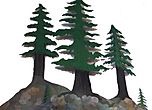Transformation: "Not Somewhere Else, But Here"
- Evergreen UU

- Aug 22, 2019
- 2 min read
Updated: Aug 29, 2019
Thank you to those who came to the discussion on Sunday about this essay from UU scholar/theologian Rebecca Parker after the worship service!
This series is intended to prepare us for the Open Question Cafe after the worship service on September 8 - and the question is (intentionally) fairly broad:
"How are we called to transform:
a) as a fellowship,
b) the community of which we are a part, and
c) systems of oppression?"
With such a broad question, there’s a risk of not going particularly deep - which doesn’t allow for much transformation!
So, discussing Parker’s essay was intended to dip into some depth in one particular area: racism in the US. (Given what is happening both internationally and also in our denomination, this is a key area of concern for many at this moment in history.)
In her essay, Parker describes four spiritual practices “to inhabit my own country, […] to become a participant in the actual history and social reality of the land in which I have been born and to which I belong":
Theological reflection,
Remedial education,
Soul work, and
Engaged presence.
Each of these can be helpfully suggestive of how we might be called to transform.
As you read Parker and consider her words:
toward what transformation are you called?
*
Additional Resources:
One of the things that came up in our discussion on Sunday was the idea that race has always been a significant issue when people of different races have come together. However, although this is a common understanding, it is likely not factual. Some further reading on this topic:
The Invention Of The White Race by Theodore W. Allen describes in detail the advent of racialization. (a video summary can be found here)
The History Of White People by Nell Irvin Painter describes the history of how whiteness became a thing and how that has shifted over time (including how it came about in the first place).
Good White People by Shannon Sullivan is a wonderfully grounded and clear exploration of the challenges and possibilities of creating a positive white racial identity. It’s near the top of the list of books that I commonly recommend to people.
Learning To Be White by Thandeka, in which the UU scholar lays out the history and dynamics of white racial identity in the US.
When we think about Transformation, though, there are many issues that intersect with race. Some other resources that I would recommend to accompany this series (which all touch both internal and societal transformation) are:
Borderlands/La Frontera: The New Mestiza by Gloria Anzaldua, which “challenge[s] how we think about identity" and discusses the “psychic, social, and cultural terrain the we inhabit, and that inhabits us."
Kids These Days: Human Capital And The Making Of Millennials by Malcolm Harris, which lays out the socio-political and cultural transformations that have occurred in US society over the past few decades - and which are vitally relevant to how differently different generations see the world.
A Testament Of Hope: The Essential Writings And Speeches by Martin Luther King, Jr. needs no introduction.
Sister Outsider: Essays And Speeches and I Am Your Sister: Collected And Unpublished Writings Of Audre Lorde by Audre Lorde are fabulous collections of work from one of the most incisive minds to look at the dynamics of oppression and liberation.



Comments